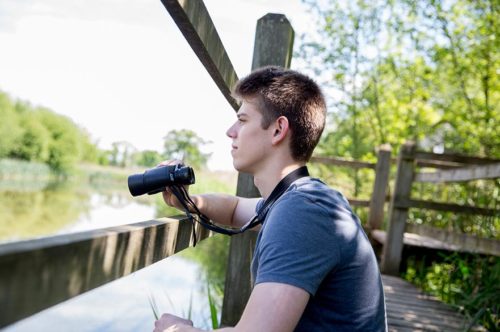Opis tego kierunku w języku polskim znajdziesz tutaj:
https://studiawanglii.pl/courses/ochrona-przyrody/
This course combines the scientific principles of animal function and behaviour with conservation biology. You will acquire sound knowledge of the ecological processes and theories surrounding wildlife conservation while developing the skills to identify, monitor and manage wild animals and their habitats. You will graduate with a range of transferable skills, enabling you to work in the diverse field of wildlife conservation in the UK and overseas.
Why choose this course?
This degree will give you the opportunity to learn through practical experience and develop a strong understanding of essential aspects such as animal biology, wildlife surveying and habitat management principles. You will be able to carry out your own personal piece of wildlife research, all the while gaining skills to enable you to work in the diverse field of wildlife conservation in the UK and abroad.
- You will be taught at Brackenhurst Campus, which is the ideal rural environment for studying wildlife conservation. With easy access to Nottingham city centre, you get the best of both worlds.
- You will take part in a residential overseas field course to Spain during your second year. This will enable you to study wildlife in a range of habitats. The field course includes studies on:
- estimating the presence of brown bears
- sampling the population of wolves via howl recordings
- using invertebrate sampling to determine water quality
- You will also take part in a residential field course in your final year. There is the opportunity to study wildlife in the UK (Pembrokshire) or South Africa (Mankwe Wildlife Reserve). The field courses currently include studies on:
- coastal management
- the effect of savannah burning on large mammal diversity
- You can choose to take part in our International Exchange programme and study abroad for part of your course.
- You’ll learn from our expert staff who have recently had pieces of work featured on ITV’s Nature Nuts and in The Conversation.
- Research undertaken in your final year is often used by conservation organisations.
- You’ll be in great company – David Attenborough was awarded an honorary degree from NTU in 2010.
Careers and employability
Upon graduation, you will have the skills needed to become a:
- conservationist
- ecologist
- ecological consultant
- environmental officer
- field biologist
- project ecologist
- species officer
- warden
- wildlife journalist
- wildlife researcher
- Safari Tour Guide
Our graduates work for companies such as:
- Natural England
- The Wildlife Trusts
- RSPB
- ecological consultancies
- local and county councils
- environmental consultancies
- ecological consultancies
- various zoos and wildlife parks such as Longleat Safari Park and Mankwe Wildlife Reserve, South Africa.
Some students opt to take an industrial placement between Year Two and Year Three providing them with the opportunity to spend an additional year working in industry. This is an excellent chance to explore an aspect of wildlife conservation that might interest you as a career and at the same time significantly increase employment prospects.
Placements can be undertaken with one or several organisations, either in the UK or abroad. A placement diploma is available for students who have undertaken a substantial placement of at least 36 weeks. A placement certificate in available for students who have undertaken a shorter placement of at least 6 weeks.
What are the benefits of a work placement?
Practical work experience has many benefits for you. It can help you in your day-to-day studies and is often paid. It can enhance your commercial awareness and your ability to link theory and practice which will be an invaluable skill in your future career. Although a work placement is highly recommended, obtaining one is based on an individual’s efforts and is not guaranteed.
Recent student placements have included:
- EMEC Ecology and Baker Consultants
- RAFFIC International
- Convention on International Trade in Endangered Species of Wild Fauna and Flora (CITES)
- Rutland Water Nature Reserve
- The Wildlife Trusts
- Whale and Dolphin Conservation
- West Midlands Safari Park
- Durrell Wildlife Conservation Trust
- Mankwe Game Reserve (South Africa)
- Cheetah Outreach (South Africa)
International Exchange
This course also offers the opportunity to get involved in our International Exchange programme and study abroad at another university for part of the second year. Students have previously been involved in exchanges with the University of Guelph in Canada and Murdoch University in Australia.




















